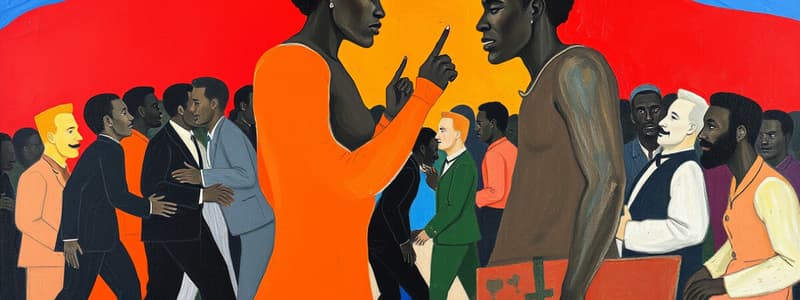Podcast
Questions and Answers
What was the main implication of the Plessy v. Ferguson ruling regarding race?
What was the main implication of the Plessy v. Ferguson ruling regarding race?
- It declared that all races should be treated equally under the law.
- It mandated equal accommodations for all races on public transportation.
- It established that social distinctions based on race could not be abolished by legislation. (correct)
- It recognized the superiority of one race over another in legal terms.
According to the content, what does the term 'sharecropping' refer to?
According to the content, what does the term 'sharecropping' refer to?
- A form of civil rights activism among African Americans.
- The practice of imposing voting restrictions based on race.
- A system of forced labor for prisoners in the South.
- An economic system in which landowners allow tenants to work their land for a share of the produce. (correct)
What does the phrase 'organized voter suppression' refer to?
What does the phrase 'organized voter suppression' refer to?
- International efforts to observe and report on elections.
- Coordinated actions aimed at preventing specific groups from voting. (correct)
- Efforts to increase voter participation among marginalized groups.
- Legal measures to ensure all citizens have equal voting rights.
What argument is made regarding racial instincts in the Plessy v. Ferguson ruling?
What argument is made regarding racial instincts in the Plessy v. Ferguson ruling?
What distinction is made regarding property rights in the context of race in the Plessy v. Ferguson case?
What distinction is made regarding property rights in the context of race in the Plessy v. Ferguson case?
Flashcards are hidden until you start studying
Study Notes
Jim Crow, Populism, and Citizenship
- The era marked by Jim Crow laws enforced racial segregation in the Southern United States, institutionalizing systemic racism post-Reconstruction.
- Populism during this period often sought to unite poor whites against blacks, framing social and economic issues through a racial lens to distract from class struggles.
Rise of Sharecropping
- Emergence of sharecropping as a labor system following the Civil War created a cycle of poverty for many African Americans.
- Sharecropping often led to exploitation, limiting economic independence and keeping families in debt to landowners.
Prison Labor Systems in the South
- Southern states implemented prison labor systems as a means of maintaining control over African Americans and exploiting their labor.
- Convict leasing became common, wherein prisoners, mostly black, were leased out to private companies, perpetuating a cycle reminiscent of slavery.
Organized Voter Suppression
- Systematic disenfranchisement tactics including literacy tests, poll taxes, and intimidation targeted African American voters to dilute their political influence.
- Organizations and laws established in the Jim Crow era sought to undermine the recent gains of African Americans in voting rights.
Plessy v. Ferguson (1896)
- This landmark Supreme Court case upheld the constitutionality of racial segregation under the "separate but equal" doctrine.
- The ruling highlighted that legislation could not change racial instincts or social hierarchies; it reinforced the belief in the inherent social inferiority of African Americans.
- It established a legal precedent that enabled the continuation of segregation and discrimination against black citizens.
Studying That Suits You
Use AI to generate personalized quizzes and flashcards to suit your learning preferences.




